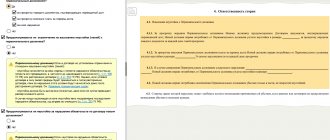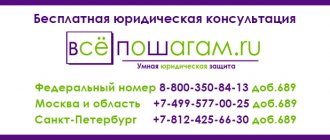In “1C: Accounting 8”, starting with version 3.0.65, you can reflect the gratuitous transfer of goods - gifts, winnings, prizes, promotional items, etc. - using the “Gratuitous Transfer” document. We also talk about the taxation of transactions involving the gratuitous transfer of property.
On the legal regulation, personal income tax taxation of gifts to employees and the procedure for reflecting income in the form of gifts in the 1C: Salaries and Personnel Management 8 program, edition 3, see the article “Gifts to employees: how to register and reflect in 1C.”
We come across the gratuitous transfer of goods, work results and services quite often. These are situations when the following are transmitted:
- gifts for employees and (or) their children;
- gifts to employees of counterparty organizations;
- winnings and prizes in competitions, competitions, games and other events;
- product samples for potential buyers, including food products for tasting;
- printing and souvenir products for advertising purposes;
- goods (work, services) for charitable purposes;
- bonus products;
- stationery and printing products at seminars, conferences and symposiums.
This list can be continued. Sometimes such transfers are due to business customs and traditions accepted in society. Sometimes directly related to economic benefits that can be obtained in the future. In any case, gratuitous transfers allow you to create a positive image of the company.
Let's look at how gratuitous transfers are regulated by civil and tax laws, as well as accounting regulations.
Gratuitous transfer or donation
An organization, while carrying out its activities, can accept from other organizations or transfer to them property belonging to the company, without expecting any reciprocal steps in return, that is, free of charge . This is expressly permitted by Art. 572 of the Civil Code of the Russian Federation.
What kind of agreement can be used to formalize the gratuitous transfer of real estate between organizations?
Once the property has been donated, the organization receiving it does not in any way assume the following obligations.
- This or that form of payment for the received property.
- Counter provision of services, performance of work, reciprocal property barter.
A gift , in contrast to a gratuitous transfer, is the provision of property or money in an amount not exceeding 3 thousand rubles. and does not require documentation.
NOTE! From the point of view of the Tax Code, a transfer, even gratuitous, is a transfer of ownership of property from one legal entity to another, that is, the same implementation.
What can be donated?
Objects for gratuitous transfer may be:
- securities;
- intangible assets of the organization;
- goods;
- finished products;
- materials, raw materials;
- equipment, tools;
- real estate objects or the right to use them;
- vehicles;
- money in cash or non-cash form, as well as repayment of the financial obligations of the recipient.
IMPORTANT! If taking possession of the transferred property involves registration, for example, we are talking about a car or real estate, then the recipient party must register this property for themselves, and only then will a change of owner occur.
What property cannot be given as a gift?
IMPORTANT! A sample agreement between legal entities on the transfer of non-residential premises for free use from ConsultantPlus is available at the link
Some categories of property cannot be gifted because they have limited civil circulation or are completely removed from it. Such possessions include:
- some types of weapons;
- military equipment and military equipment;
- toxic substances;
- museum and rare items;
- Natural resources.
When you don't have to pay tax
The Tax Code of the Russian Federation contains lists of gratuitous operations that:
- are not considered sales for the purposes of calculating and paying VAT (clause 2 of Article 146 of the Tax Code of the Russian Federation);
- are exempt from paying tax (Article 149 of the Tax Code of the Russian Federation).
Let's look at some of them.
Transfer of property is not a sale
Free transfer of fixed assets to state and municipal institutions, authorities and local self-government, as well as state unitary enterprises and municipal unitary enterprises is not considered a sale (subclause 5, clause 2, article 146 of the Tax Code of the Russian Federation). Therefore, the transferring party does not need to calculate VAT.
The gratuitous transfer of funds is also not regarded as a sale, therefore it is not subject to VAT on the transferring party (subclause 1, clause 3, article 39 of the Tax Code of the Russian Federation, subclause 1, clause 1, article 146 of the Tax Code of the Russian Federation).
The gratuitous transfer of valuables or other benefits for the implementation of the main activity specified in the charter of the enterprise and other than entrepreneurial activity to non-profit organizations will not be considered a sale (subclause 3, clause 3, article 39 of the Tax Code of the Russian Federation). In this situation, the basis for calculating and paying tax is not formed, which means there are no obligations to calculate and pay VAT.
From 07/01/2019 the following are not recognized as subject to VAT:
- free transfer of socio-cultural objects to the treasury of a constituent entity of the Russian Federation or municipal entity;
- gratuitous transfer of real estate to the treasury of the Russian Federation;
- free transfer of property to Russia for scientific research in Antarctica.
Let's consider an example of a gratuitous transfer of valuables to an educational institution.
An educational institution can act both as a non-profit organization and as a commercial one. Legally, an educational institution can be a legal entity of any organizational and legal form, the main activity of which is educational activity, which must be noted in the organization’s charter and is based on passing accreditation in the established order. Individual entrepreneurs engaged in educational activities can also be classified as educational organizations. That is, when carrying out a transaction for the gratuitous transfer of valuables to an educational institution, enterprises may encounter both institutions belonging to non-profit structures and commercial organizations.
The gratuitous transfer of property to an educational institution belonging to a non-profit organization (for example, a state educational institution), aimed at carrying out the main activities reflected in the charter of this enterprise, will not be subject to VAT.
At the same time, it is important to indicate in the gift agreement the further use of gratuitously transferred material assets and other benefits in the main (registered in the charter) activities of the recipient enterprise, which is a non-profit organization.
Drawing up an invoice for the gratuitous transfer of valuables to non-profit organizations, if the benefits received are used only in the statutory activities of the enterprise other than business, is not required (clause 3 of Article 169 of the Tax Code of the Russian Federation).
Find out whether the gratuitous transfer of gift certificates to employees is subject to VAT in ConsultantPlus. To do everything correctly, get trial access to the system and go to the material. It's free.
The gratuitous transfer of property will be subject to VAT if the recipient of assistance turns out to be a commercial enterprise (for example, a private educational institution).
When transferring property, there is a VAT benefit
It is possible not to pay tax in cases where the benefit under Art. 149 of the Tax Code of the Russian Federation, which exempts this operation from VAT.
Thus, the distribution of advertising magazines, booklets, leaflets and other things is exempt from VAT if no more than 100 rubles were spent on the creation or purchase of a copy of this assortment. including VAT (subclause 25, clause 3, article 149 of the Tax Code of the Russian Federation).
There is no need to pay VAT when transferring valuables free of charge for charitable purposes (subclause 12, clause 3, article 149 of the Tax Code of the Russian Federation). The exception is the transfer of excisable goods.
Charity in the legislation is considered as an activity for the disinterested (free) transfer of material assets or other benefits to legal entities or individuals on a voluntary basis (Article 1 of the Law “On Charitable Activities...” dated 08/11/1995 No. 135-FZ. But this benefit is possible only if compliance with the following conditions:
- the assistance provided must strictly correspond to the charitable purposes specified in the list of paragraph 1 of Art. 2 Law No. 135-FZ;
- recipients of material assets, as well as gratuitous assistance in the form of other benefits, can only be non-profit organizations or individuals;
- the gratuitous transfer of valuables must be documented (letters of the Ministry of Finance of Russia dated October 26, 2011 No. 03-07-07/66, Federal Tax Service of the Russian Federation for Moscow dated December 2, 2009 No. 16-15/126825): an agreement on the agreement of the parties to transfer free of charge;
- copies of documents confirming the acceptance of valuables for registration by the recipient of gratuitous assistance;
- acts or other documents confirming the intended use of the transferred values.
When a charitable transfer of material assets occurs, the transaction is considered taxable, but exempt from tax. The obligation to draw up an invoice for transactions exempt from VAT from January 1, 2014 on clause 3 of Art. 3 of the Law “On Amendments...” dated December 28, 2013 No. 420-FZ). Therefore, when transferring valuables in the form of charitable assistance, an invoice need not be drawn up.
On the application of Art. 149 of the Tax Code of the Russian Federation, read more in this section of our website.
Limits on gifts and gratuitous transfers
It is impossible to transfer property for an unlimited amount free of charge, just as expensive gifts between business partners are illegal. The law allows gifts of no more than 3 thousand rubles; everything else donated must be formalized with an appropriate agreement and carried out in accounting.
Limits are lifted in certain situations specified by law:
- the property is transferred to a budgetary or public structure;
- donate to a religious organization;
- assets are received by a non-profit structure, a charitable foundation, etc.
FOR YOUR INFORMATION! The organization also has the right to make a gift to an individual, but only if he does not hold a government position, does not work in a bank or in social structures (medical, educational, etc.).
As for receiving something as a gift, an organization can be gifted, even for a large amount:
- an individual;
- government agency;
- municipal organization.
Transfer of winnings and prizes to competition winners
The transfer of winnings and prizes to individuals based on the results of contests, competitions and other events is also recognized as a gratuitous sale and is subject to VAT. In this sense, prizes are no different from gifts.
For profit tax purposes, expenses for the acquisition (production) of prizes awarded to the winners of drawings of such prizes during mass advertising campaigns are considered standard advertising expenses (Clause 4 of Article 264 of the Tax Code of the Russian Federation). Such expenses will be recognized in an amount not exceeding 1% of sales revenue, determined in accordance with Article 249 of the Tax Code of the Russian Federation.
If the holding of a contest or competition does not pursue advertising purposes, is not provided for by a collective agreement and is not included in the remuneration system, then the cost of winnings will not be included in expenses.
As for personal income tax, the cost of winnings and prizes received in competitions, competitions, games is taxed at the following rates (clauses 1, 2 of Article 224, clause 28 of Article 217 of the Tax Code of the Russian Federation):
- 35% - in terms of exceeding 4,000 rubles, if the event is held for the purpose of advertising goods, works and services;
- 13% and without applying a deduction of 4,000 rubles, if the event is held for other purposes (letter of the Ministry of Finance of Russia dated August 20, 2018 No. 03-04-05/58919);
- 13% - in terms of excess of 4,000 rubles, if the event is held according to decisions of the Government of the Russian Federation and representative authorities (letter of the Ministry of Finance of Russia dated November 14, 2018 No. 03-04-06/81966).
Let's look at how in "1C: Accounting 8" (rev. 3.0) you can reflect the transfer of prizes to the winners of a drawing held as part of an advertising campaign.
Example 2
| Modern Technologies LLC is participating in the exhibition in March 2021, where it is holding a prize draw among visitors for advertising purposes. A total of 10 prizes worth RUB 1,200.00 are being drawn. (including VAT 20% - RUB 200.00). The winners are determined by random sampling using a computer program. According to tax accounting data, the amount of expenses for holding prize draws does not exceed 1% of sales revenue for the current reporting period. |
It is also convenient to reflect the transfer of prizes using the Gratuitous Transfer document. The procedure for filling out the Products tab is similar to the procedure described in Example 1. Since prizes are given to an indefinite number of people, the Recipient field also does not need to be filled out.
On the Cost account tab in the Cost account field, you should independently set the required account (for example, account 44.01 “Distribution costs in organizations engaged in trading activities” with the expense type Advertising expenses (standardized)).
According to the Ministry of Finance of Russia and the Federal Tax Service of Russia, expenses in the form of VAT amounts paid by an organization when distributing advertising products free of charge cannot be taken into account when calculating income tax (letter of the Ministry of Finance of Russia dated March 11, 2010 No. 03-03-06/1/123, dated November 20, 2006 No. 02-1-07/92). This conclusion can be extended to the transfer of prizes to the winners of a drawing held as part of an advertising campaign. Therefore, in the VAT Account field, you should leave account 91.02, which is offered by the program by default (Fig. 3).
Rice. 3. Cost accounts for the transfer of prizes as part of an advertising campaign
After posting the Gratuitous Transfer document, the following accounting register entries are generated:
Debit 44.01 Credit 41.01 - for the cost of prizes (10,000 rubles). Debit 91.02 Credit 68.02 - for the amount of accrued VAT (2,000 rubles).
For tax accounting purposes for income tax, amounts are entered into special resources of the accounting register:
Amount Dt NU 44.01 and Amount Kt NU 41.01 - for the cost of prizes (10,000 rubles). Amount Dt PR 91.02 - for a constant difference (2,000 rubles).
In the month of transfer of prizes, after completion of the month-closing processing and completion of the regulatory operation Calculation of deferred tax according to PBU 18, a constant tax expense will be recognized:
Debit 99.02.3 Credit 68.04.2 - in the amount of 400 rubles. (RUB 2,000 x 20%).
The settlement certificate or summary invoice issued upon transfer of prizes will be recorded in the sales book with the transaction type code “10”. The cost of the prizes issued will be included in indirect expenses, which are reflected in the income tax return on line 040 of Appendix No. 2 to Sheet 02.
In the statement of financial results, the cost of prizes is reflected in line 2210 “Business expenses”, and the amount of accrued VAT is reflected in line 2350 “Other expenses”.
| 1C:ITS For information on how to reflect the accrual of VAT for advertising distribution of goods, see the reference book “Accounting for Value Added Tax” in the “Accounting and Tax Accounting” section. |
Accounting for gratuitous transfers
The accounting department of both the giving and receiving parties is obliged to carry out the registration of donated assets prescribed by law.
Postings of the donor company
From an accounting point of view, the company, by donating part of its property, thereby reduced its assets. With the disposal of a certain share of fixed assets, economic efficiency theoretically decreases. Therefore, such an operation is carried out according to expense items (clause 2 of PBU No. 10/99).
IMPORTANT! The cost of a gift and expenses for its gratuitous transfer are not equated to income tax expenses (Article 270 of the Tax Code of the Russian Federation).
Host party accounting
The company that accepted the property as a gift thereby increased its assets. The cost of the income thus obtained should be reflected in the main indicators, taking into account depreciation (clause 47 of the Methodological Recommendations).
To correctly determine the value of donated assets, you need to take its market equivalent, current on the date of registration of funds (clause 10 of Accounting Rules No. 6/01), plus additional costs associated with the introduction of ownership, if the company incurred them (for example, for transportation, registration, etc.)
From a posting point of view, accounting will look like this:
- debit 08, account 98 “Gratuitous receipts” - the amount of the value of assets is entered;
- debit 08, account 60 “Related expenses” - expenses associated with the transfer of assets are entered.
Results
The obligation to charge and pay VAT upon gratuitous transfer of property arises in cases where:
- the recipient of the valuables is a commercial organization (the transferring party will have to calculate VAT and pay it to the budget);
- a charitable transfer of valuables to a non-profit organization or individual is carried out; however, based on the benefits under sub. 12 clause 3 art. 149 of the Tax Code of the Russian Federation, tax may not be paid when registering a transaction, taking into account all established requirements.
The gratuitous transfer of property will not be subject to VAT if:
- funds are transferred (subclause 1, clause 3, article 39, subclause 1, clause 1, article 146 of the Tax Code of the Russian Federation);
- the receiving party is a non-profit organization (for example, a state educational institution) and the values received as a gift are aimed at carrying out the main activities reflected in the charter of this institution (subclause 3, clause 3, article 39 of the Tax Code of the Russian Federation);
- gratuitous transactions are not recognized as sales for the purposes of calculating VAT (clause 2 of article 146 of the Tax Code of the Russian Federation).
Sources: Tax Code of the Russian Federation
You can find more complete information on the topic in ConsultantPlus. Free trial access to the system for 2 days.
Registration under the contract
The transfer of property between legal entities must be registered by contract. The law provides for this purpose two forms of drawing up such a document.
- Donation agreement. It is concluded if the provision of property does not require any reciprocal obligations. The recipient company thus receives income in the amount of the value of the property it received free of charge if it were sold. The donor incurs the expense.
- Agreement for free use (loan). According to this form of transfer, assets are transferred free of charge, but with the condition of their return in the same form, naturally, taking into account the provided depreciation. At the same time, it is not necessary to stipulate the transfer period in the contract; it can be considered valid until the liquidation of the organization or for life. Formally, the recipient does not take ownership of the transferred property, but in fact can use it as his own.
Regarding taxation, such an agreement provides for the donor to receive profit, which implies tax. The amount of the tax base is calculated based on the market price, but should not be less than the residual value shown in the donor’s accounting department.
The transaction is completed by issuing a transfer and acceptance certificate.
Documents required for registration
When going to a notary to conclude one of these types of contracts, representatives of organizations need to prepare the following documents:
- statement from the donor (the lawyer will tell you how to draw it up correctly);
- registration documents of both companies;
- papers confirming the authority of persons to enter into contracts on behalf of the company;
- identity cards of authorized representatives;
- title documents for the donated property.
ATTENTION! Check the list of documents that will be needed in your particular case: the list may differ from one notary to another, and for some categories of gifts, special papers are sometimes required.
How does the deal happen?
Even if there is no fee involved in the transfer of certain assets, this operation is legally a transaction. Its registration takes place in the presence of a notary according to the following procedure.
- The process of agreeing on the transfer of part of the property between companies (their representatives).
- The donating company documents the ownership of assets transferred to another legal entity.
- Drafting a statement from the company making the gift declaring this intent.
- Drawing up an agreement on a gift or gratuitous transfer (loan).
- Certification of the contract by a notary in the presence of representatives of both legal entities.
- State registration of the agreement in the local Office of the Federal Registration Service.
Tourist packages
Situation: is it necessary to charge VAT when transferring tourist packages abroad to citizens free of charge? The vouchers were purchased from a Russian tour operator and are given as prizes. The tour operator's invoice highlights the amount of VAT on the agency fee
Answer: yes, it is necessary.
This conclusion is based on the provisions of subparagraph 1 of paragraph 1 of Article 146 of the Tax Code of the Russian Federation, according to which the gratuitous transfer of goods (work, services) on the territory of Russia is subject to VAT. The basis for calculating VAT is the market value of the trip (clause 2 of Article 154 of the Tax Code of the Russian Federation). It is impossible to qualify the transfer of vouchers as the provision of tourist services abroad in the situation under consideration. The fact is that the organization that transfers vouchers to citizens does not provide such services. They are sold by the tour operator. This follows from the definitions of tour operator and travel agency activities, which are given in Article 1 of the Law of November 24, 1996 No. 132-FZ. Consequently, only the tour operator is subject to the norms of subparagraph 3 of paragraph 1 of Article 148 of the Tax Code of the Russian Federation, which allows not to charge VAT on the cost of tourist services actually provided abroad.
Since purchased vouchers are used in transactions subject to VAT, the amount of input tax presented by the tour operator, the organization that transfers vouchers to citizens (subject to other mandatory conditions), can be deducted (Article 171 of the Tax Code of the Russian Federation).
What about taxes?
Because a gift is an income, in some cases it is subject to appropriate tax. The difference depends not only on the amount of the transferred asset, but also on the tax system followed by the recipient legal entity. In the general system, the legal entity-donor pays VAT (the gift is carried out as a sale), and the recipient pays tax on non-operating income (Article 250 of the Tax Code of the Russian Federation).
VAT is not paid if:
- assets were received under international treaties of the Russian Federation;
- the transferred funds are intended for the safety of nuclear power plants;
- the property was donated by the founder-owner of 50% or more of the authorized capital;
- donate to a non-profit educational institution;
- funds are donated to charity;
- money is given in any form.
IMPORTANT INFORMATION! Some cases of donation provide for preferential VAT.
Calculation options
To calculate VAT, it is necessary to determine the market price of the gratuitously transferred property (work, services) in accordance with the requirements of Chapter 14.2 of the Tax Code of the Russian Federation. If the parties to the transaction are not interdependent persons, the price indicated in the primary accounting documents used to formalize the gratuitous transfer can be used as the market price (letter of the Ministry of Finance of Russia dated October 4, 2012 No. 03-07-11/402).
Calculate VAT depending on how the property (work, services) transferred free of charge was accounted for:
- at a cost that includes the amount of input tax;
- at a cost that does not include tax.
In the first case, charge VAT on the difference between prices (clause 3 of Article 154 of the Tax Code of the Russian Federation). Calculate the amount of VAT that needs to be charged on the value of the property transferred free of charge as follows:
| VAT | = | Market price of gratuitously transferred property, including VAT | – | Purchase value of property transferred free of charge (residual value taking into account revaluation) including VAT | × | 18/118 (10/110) |
In the second case (if there is no input tax in the cost of donated goods), calculate VAT based on the market price taking into account excise taxes (for excisable goods) and without including the amount of tax (clause 2 of Article 154 of the Tax Code of the Russian Federation).
Determine the amount of VAT that needs to be charged on the cost of goods (work, services) transferred free of charge as follows:
| VAT | = | Market price of gratuitously transferred goods (works, services) including excise taxes (for excisable goods) without VAT | × | 18% (10%) |
An example of reflecting VAT in accounting when transferring goods free of charge
OJSC "Proizvodstvennaya" sells both its own products (confectionery) and purchased goods (food products).
In the second quarter, during a corporate holiday - the anniversary of the Master confectionery factory - former employees of the factory were given free of charge:
- from the finished product warehouse - a batch of confectionery products with a cost of 6,000 rubles. (subject to VAT at the rate of 18%);
- from a warehouse of purchased goods - a batch of food products (pasta, cereals, vegetable oil) with a cost of 2000 rubles. (subject to VAT at a rate of 10%, subparagraph 1, paragraph 2, article 164 of the Tax Code of the Russian Federation).
Market prices determined taking into account the requirements of Chapter 14.2 of the Tax Code of the Russian Federation are the following indicators (excluding VAT):
- for confectionery products – 15,000 rubles;
- for food – 3000 rubles.
The total amount of VAT payable to the budget for this operation will be 3,000 rubles, including:
- for confectionery products – 2700 rubles. (RUB 15,000 × 18%);
- for food – 300 rub. (RUB 3,000 × 10%).
In the second quarter, Master’s accountant made the following entries:
Debit 91-2 Credit 43 – 6000 rub. – a batch of own-produced products was donated free of charge;
Debit 91-2 Credit 41 – 2000 rub. – a batch of food products was donated free of charge;
Debit 91-2 Credit 68 subaccount “VAT calculations” – 3000 rubles. – VAT payable to the budget has been accrued.
An example of reflecting VAT in accounting for gratuitous services is the placement of outdoor advertising. In February, the organization placed an advertisement for its partner on one of the billboards free of charge. The costs associated with the provision of such services amounted to RUB 20,000.
The market price of services, determined taking into account the requirements of Chapter 14.2 of the Tax Code of the Russian Federation, is recognized as the amount of 25,960 rubles. (in view of VAT).
The amount of VAT payable to the budget for this operation will be: RUB 25,960. × 18/118 = 3960 rub.
In February, Alpha’s accountant made the following entries:
Debit 91-2 Credit 20 – 20,000 rub. – the cost of services provided free of charge is written off;
Debit 91-2 Credit 68 subaccount “VAT calculations” – 3960 rubles. – VAT payable to the budget has been accrued.
Clarifications from the Ministry of Finance dated July 20, 2017
Letter dated July 20, 2021 N 03-07-11/46167
Tax lawyer Gordon A.E.
To promote products, donating samples is a well-known marketing technique. When advertising your achievements in this way, you should not forget about possible claims from tax authorities for payment of VAT and income tax - gratuitous transfer of goods for advertising purposes are subject to VAT taxation if the cost of purchasing or creating a unit of goods exceeds 100 rubles. In addition, it will not be possible to take into account the cost of goods transferred free of charge as income tax expenses. This is what the Ministry of Finance of the Russian Federation explained in a letter dated July 20, 2017 No. 03-07-11/46167.
Invoice
For the cost of gratuitously transferred goods (work, services), no later than five days after their shipment (fulfillment, provision), issue an invoice (subclause 1, clause 3, article 169, clause 3, article 168 of the Tax Code of the Russian Federation). In the invoice, indicate the market value of the transferred goods (work, services) or the price difference, as well as the amount of VAT calculated for payment to the budget. Register the issued invoice in the sales book in the period when the goods were transferred (work performed, services provided) (clauses 1, 3 of Section II of Appendix 5 to the Decree of the Government of the Russian Federation of December 26, 2011 No. 1137).






